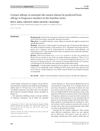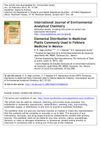Mentha Piperita
Research
20 / 264 results
research Effect of Aloe Vera and Mentha Piperita Combination Serum on CDK1 and CDC25 Expression in Chemotherapy-Induced Alopecia Rats
The combination of mint and Aloe vera serum may help reduce hair loss from chemotherapy.

research Anthelmintic Effect of Mentha Spp. Essential Oils on Echinococcus Granulosus Protoscoleces and Metacestodes
Mint essential oils can kill parasites that cause cystic echinococcosis, with M. pulegium oil being more effective than M. piperita oil.

research Hydrogel Film Sheets-Based Medicinal Plants for Diabetic Wound Dressing Application: A Review
Medicinal plant-based hydrogel films are promising for diabetic wound dressings.

research Effectiveness of Mentha Spicata Leaves in Reducing Testosterone Levels and Aggressive Behavior in Female Wistar Albino Rats Treated with Testosterone Propionate
Mentha spicata leaves lower testosterone and aggression in female rats.

research Peppermint Oil Promotes Hair Growth Without Toxic Signs
Peppermint oil can effectively promote hair growth without being toxic.

research Contact Allergy to Essential Oils Cannot Always Be Predicted from Allergy to Fragrance Markers in the Baseline Series
Allergies to some essential oils may not be found with standard fragrance tests.

research Harmless Herbs? A Review of the Recent Literature
Herbal remedies can cause adverse effects and need more safety research.

research Plants Used in Cosmetics
Natural products in cosmetics are beneficial for skin and hair care with low toxicity.

research Cosmetics and Cosmeceutical Applications of Chitin, Chitosan, and Their Derivatives
Chitin and chitosan are useful in cosmetics for oral care, haircare, and skincare, including UV protection and strength improvement.

research Essential Oils and Their Single Compounds in Cosmetics: A Critical Review
Essential oils in cosmetics can offer benefits but may cause allergies and should be used carefully.

research Review of Pharmacological Effects of Myrtus Communis L. and Its Active Constituents
Myrtle has various health benefits and potential for medicine development.

research Plant Cell Culture as Emerging Technology for Production of Active Cosmetic Ingredients
Plant cell culture is a promising method for creating sustainable and high-quality cosmetic ingredients.

research Mechanism of Action of Herbs and Their Active Constituents Used in Hair Loss Treatment
Some herbs and their components might help treat hair loss by affecting various biological pathways, but more research and regulation are needed.

research Novel Cosmeceuticals from Plants: An Industry-Guided Review
Plant-based ingredients are effective and safe for modern skincare products.

research Topically Used Herbal Products for the Treatment of Hair Loss: Preclinical and Clinical Studies
Herbal products might promote hair growth with fewer side effects, but more research is needed to confirm their safety and effectiveness.

research Developing Formulations for Drug Follicular Targeting: Nanoemulsions Loaded with Minoxidil and Clove Oil
Nanoemulsions with minoxidil and clove oil effectively target hair follicles for better alopecia treatment.

research The New Paradigm for Androgenetic Alopecia and Plant-Based Folk Remedies: 5α-Reductase Inhibition, Reversal of Secondary Microinflammation, and Improving Insulin Resistance
Plant-based remedies may treat hair loss by reducing inflammation and improving insulin resistance.

research Aromatherapy: An Art of Healing
Aromatherapy uses essential oils to improve mood and well-being.

research Development of Optimized Self-Nanoemulsifying Lyophilized Tablets to Improve Finasteride Clinical Pharmacokinetic Behavior
Improved tablets lead to faster, better drug absorption for hair loss treatment.

research Elemental Distribution in Medicinal Plants Commonly Used in Folklore Medicine in Mexico
Most medicinal plants in Mexican folklore have safe element levels, but arsenic exceeds safe limits in almost all.